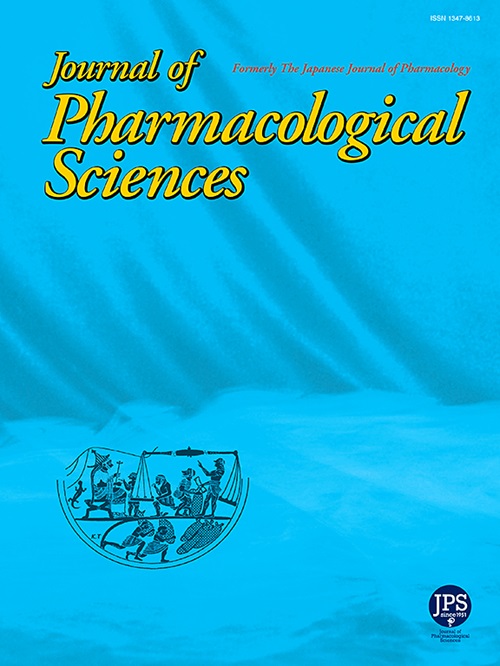A selective eukaryotic elongation factor 2 kinase inhibitor, A484954 lowered blood glucose in Zucker fatty diabetes mellitus rat
IF 2.9
3区 医学
Q2 PHARMACOLOGY & PHARMACY
引用次数: 0
Abstract
Eukaryotic elongation factor 2 kinase (eEF2K) is a protein kinase, regulating peptide translation. Zucker fatty diabetes mellitus (ZFDM) rat is a recently developed obesity and type 2 diabetes animal model with a missense mutation (fa) in leptin receptor gene (Lepr). ZFDM-Leprfa/fa rats (Homo) develop obesity and type 2 diabetes, while ZFDM-Leprfa/+ rats (Hetero) are normal. The aim of this study was to determine effects of A484954 on glucose metabolism in ZFDM rats. A484954 (2.5 mg/kg) or carboxymethyl cellulose (CMC; 0.5 %), a vehicle was injected intraperitoneally for 15 days in 17–19-week-old rats. Compared with Hetero CMC, in Homo CMC; 1) blood and urine glucose levels were significantly elevated, 2) Homeostatic Model Assessment for Insulin Resistance (HOMA-IR) was significantly elevated, 3) mRNA expression of sodium-glucose cotransporter (SGLT)2 in kidney tended to be elevated, while that of glucose transporter (GLUT)4 in vastus lateralis muscle decreased. Compared with Homo CMC, in Homo A484954; 1) blood glucose was significantly reduced, while urine glucose did not change, 2) HOMA-IR tended to decrease, 3) mRNA expression of SGLT2 in the kidney and GLUT4 in the muscle did not change. This study demonstrates for the first time that A484954 induces hypoglycemic effects in Homo partly via preventing insulin resistance.
A484954是一种选择性真核延伸因子2激酶抑制剂,可降低Zucker脂肪性糖尿病大鼠的血糖
真核延伸因子2激酶(eEF2K)是一种调节肽翻译的蛋白激酶。Zucker脂肪性糖尿病(ZFDM)大鼠是一种新近发现的伴有瘦素受体基因错义突变(fa)的肥胖和2型糖尿病动物模型。ZFDM-Leprfa/fa大鼠(Homo)发生肥胖和2型糖尿病,而ZFDM-Leprfa/+大鼠(Hetero)正常。本研究旨在探讨A484954对ZFDM大鼠葡萄糖代谢的影响。A484954 (2.5 mg/kg)或羧甲基纤维素(CMC;0.5%), 17 - 19周龄大鼠腹腔注射载药15天。与异CMC相比,在Homo CMC中;1)血、尿糖水平显著升高,2)胰岛素抵抗稳态模型评估(HOMA-IR)显著升高,3)肾钠-葡萄糖共转运蛋白(SGLT)2 mRNA表达有升高的趋势,股外侧肌葡萄糖转运蛋白(GLUT)4 mRNA表达有降低的趋势。与Homo CMC相比,在Homo A484954;1)血糖显著降低,而尿糖无变化;2)HOMA-IR有降低的趋势;3)肾脏中SGLT2和肌肉中GLUT4 mRNA表达无变化。本研究首次证明,A484954部分通过预防胰岛素抵抗在人体内诱导降糖作用。
本文章由计算机程序翻译,如有差异,请以英文原文为准。
求助全文
约1分钟内获得全文
求助全文
来源期刊
CiteScore
6.20
自引率
2.90%
发文量
104
审稿时长
31 days
期刊介绍:
Journal of Pharmacological Sciences (JPS) is an international open access journal intended for the advancement of pharmacological sciences in the world. The Journal welcomes submissions in all fields of experimental and clinical pharmacology, including neuroscience, and biochemical, cellular, and molecular pharmacology for publication as Reviews, Full Papers or Short Communications. Short Communications are short research article intended to provide novel and exciting pharmacological findings. Manuscripts concerning descriptive case reports, pharmacokinetic and pharmacodynamic studies without pharmacological mechanism and dose-response determinations are not acceptable and will be rejected without peer review. The ethnopharmacological studies are also out of the scope of this journal. Furthermore, JPS does not publish work on the actions of biological extracts unknown chemical composition.

 求助内容:
求助内容: 应助结果提醒方式:
应助结果提醒方式:


